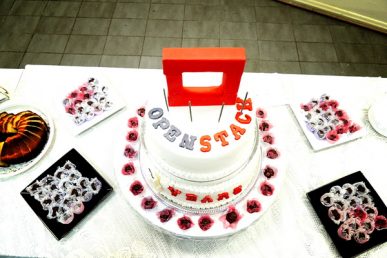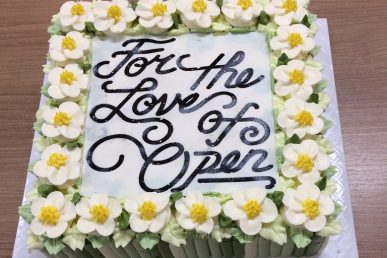OpenStack’s birthday month is officially over, but user groups from around the world still have stories to share! We’re extending our user group spotlights into August in order to continue celebrating the groups that make OpenStack a worldwide phenomenon. Today, we hear from Iran and Atlanta.
## Iran
*The Iran OpenStack User Group, based in Tehran, was formed just a few months ago with 11 members and is growing steadily each month. To learn more, visit their [Meetup page](http://www.meetup.com/Iran-OpenStack-Meetup/).*

##### 1) How long has your user group been around? Describe how it formed.
Iran OpenStack user group formed about 5 months ago by me (Roozbeh Shafiee) and my friends in Tehran. We are some Linux and network administrators and experts from companies that provide IT and telecommunication solutions to other companies to start their business. We, as high-tech solutions providers, needed a technology that could distinguish us from other competitors. After hours and hours discussions via our primary mailing list, we decided that we should use an open source platform, especially OpenStack, for our cloud projects and cloud environment. Our first physical gathering and meeting was in March 2014, before the Persian New Year. Our user group started with 11 members.
##### 2) Describe a typical user group meeting.
Our user group meetings happen approximately every 1 month, in members’ free time on the weekend. Before every meeting, we determine the place and time of meeting via our mailing list. Also before meeting, we determine a subject for presentation by someone to learn more about that together.
Joining the Iran OpenStack user group is totally free without exception and everyone who interested in open cloud and OpenStack can join us. Every member works for a company that provide IT or telecommunication solutions. Even though the companies are competing with each other in their business, we have a friendly relationship with each other and we always keep in touch via email, text massage, IRC channel and etc.
##### 3) What’s one piece of advice you would give to new users?
I advise them to have done some research about IaaS concepts and fundamentals. However, there is no academic training or training center for OpenStack in Iran yet, so if someone would like to use OpenStack or be an expert in the technology, the best resource to learn is official OpenStack documentations and the first step to test and work with OpenSTack is RDO (Red Hat Distribution OpenStack) on a single node. I always say first install RDO and next jump to the pool.
##### 4) What is the unique opportunity for OpenStack in your region?
Iran is one of developing countries in the Middle East with various big industries such as oil, petroleum, steel, and mining, which use IT as business infrastructure. With the power of OpenStack as an open IaaS cloud solution, they can improve the performance of their infrastructure and as a result improve their output. Unfortunately, the power of IT and especially cloud technologies are not known by industries in Iran yet, but we are trying to do this in future.
##### 5) What have been the biggest benefits to your user group in using OpenStack?
Actually, the biggest benefit in using OpenStack in our community is getting better jobs than before, with better salaries and becoming known as cloud experts for future job offers.
##### 6) How did you celebrate OpenStack’s 4th Birthday?
Our celebration was on July 14th, and unfortunately this date coincided with Ramadan for Muslims, so we could not serve beer or coffee and cake, but we still provided some gifts and training resources, along with a few presentation about OpenStack.
## Atlanta
*The Atlanta user group started in early 2012 and meets monthly to socialize and work together to better OpenStack. They are over 400 members. Learn more about the group on their [Meetup page](http://www.meetup.com/openstack-atlanta/).*

##### 1) How long has your user group been around? How did it form?
Our group formed in February of 2012. The Atlanta team from Dreamhost started organizing the Meetups and as we grew, members from Red Hat and Yahoo joined the organizers team.
##### 2) What does a typical user group meeting look like?
We meet at [Manuel’s Tavern](http://www.manuelstavern.com/) in Atlanta, Georgia. We usually have dinner together and socialize, then have a presentation and group discussion to talk about the presentation, help each other resolve issues we might have encountered in our deployments, and relay news from the OpenStack community.
##### 3) How do the members of your user group collaborate outside of meetings?
We use the Meetup mailing list, and we’re setting up a github organization to let us share presentations and files more easily.
##### 4) What’s one piece of advice you would give to new users?
Start small and expand over time. This gives you a chance to learn the tools you need to operate a cloud and the techniques for scaling your operations up incrementally.
##### 5) What have been the biggest benefits to your user group members in using OpenStack?
One important benefit we receive from participating in the group is learning about the variety of deployment configurations from the other members. We have members with different size clouds built on different backend technologies and distributions. Learning about the choices others have made in their deployments gives us options when we run into roadblocks in our own.
##### 6) How did you celebrate OpenStack’s 4th birthday last month?
Our July meeting was purely a social event. We talked shop, but didn’t have a presentation planned, so that gave us more time to talk informally.
///
##### If you’d like your user group to be featured on Superuser, please email us at [[email protected]](mailto:[email protected]). We’d love to learn more about your group!
- Musings and Predictions from Superuser’s Editorial Advisors - January 29, 2015
- Kilo Update: Trove - January 9, 2015
- Kilo Update: Ceilometer - December 19, 2014

)










